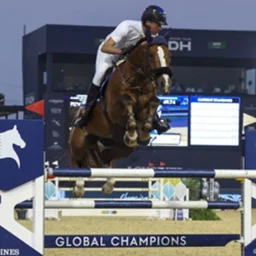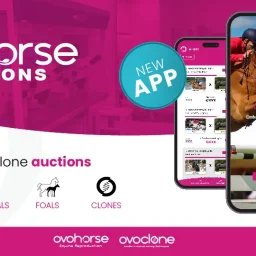
Ovohorse laboratories allow us to carry out, with the protection of 20 years of experience in assisted reproduction, all those techniques for the production of in vitro embryos from donor mares with the best genetics. But producing the embryos is only the first step. Afterwards, these will be transferred to the receiving mares, which play a key role, since they will be in charge of producing future foals with the desired genetics. Therefore, it is essential that these mares meet a series of requirements.
Embryo transfer is a technique that is usually carried out to obtain offspring from an exceptional mare, either because of its talents in some discipline or sport and has a brilliant sporting career, or because it has a reproductive or health problem. Thanks to this technique, the risks associated with pregnancy, birth and postpartum in donor mares (biological mothers) can be avoided.
We can talk about washing embryo transfer (ET), or ICSI embryos. The first are generated naturally in the body of donor mothers, post insemination. These are done “blindly” since on approximately day 7, it is still not possible to detect these embryos with a sonography, and several recipient mares need to be synchronized. However, with ICSI in vitro embryos, you already have the embryo and it is possible to transfer it at the best time.
But the success of the transfer also depends on the receiving mares, since the better they are, the higher the implantation rate. Furthermore, their well-being before, during and after birth is very important, since they will be in charge of gestating, giving birth and raising the foals.
It is also important that the mare has a good character, because if she has a difficult character, it can cause complications during the embryo transfer process, and she can even transmit part of her temperament to the offspring.
Characteristics of the ideal recipient mare
- They must be young mares; it is recommended that they be between 3 and 12 years old.
- Be in perfect health and physical condition.
- Similar size to the donor, so that the foal has space to develop and no anomalies occur during pregnancy or birth..
- In some cases, it will be mandatory that the receiving mothers be of the same breed as the foal that will be born, such as in the PRE -Pure Raza Español (Pure Spanish Race).
- That their estrous cycles are normal.
- That there are no reproductive problems or anomalies in the uterus or ovaries.
- It is suggested to do a culture of the endometrium to rule out problems such as infections.
- That they have given birth at least once, to know if they have abundant lactation and good maternal instinct.
- With good character, since this can complicate not only its management, but also that of the foal.
- Choose the best day to transfer the embryo. In the case of ICSI embryos, it is recommended to transfer on day +4 post-ovulation.
- And most importantly: Be as calm as possible, stress is the enemy of early pregnancies.



















































